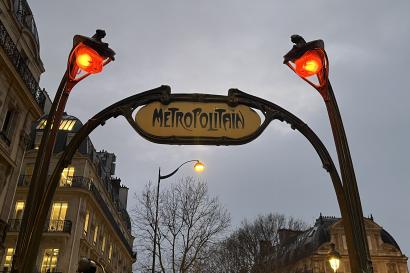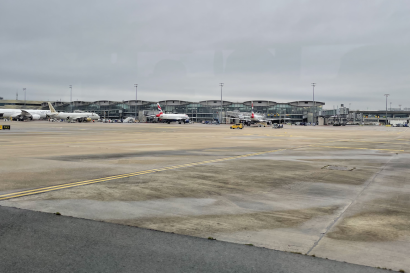
Being an American in Paris means getting used to a new way of living. Here are some tips to keep in mind when traveling around the City of Light.
10) Public transit will be your best friend.
Paris is incredibly interconnected and surprisingly simple to navigate. Between the metro, the RER train system, and the bus lines, you’re guaranteed to find a speedy way to get where you need to go around the city. Once you purchase your Navigo pass, you essentially have unlimited access to these systems, giving you the freedom to get off at any stop and hop right back on later. This means that Google Maps has also been a best friend.
9) Don’t take it personally when no one smiles at you.
Parisians always seem to be in a rush—in the metro station, on the streets, in shops. They won’t return your smile and likely won’t offer you one first. Living in a cosmopolitan city heavily trafficked by tourists requires a certain brusqueness to make it through the crowds and get where you need to go. As someone raised in the reputably friendly Midwest, the Parisian demeanor can come across as standoffish or rude, but it’s important to not feel offended by natural cultural differences.
8) Fashion matters.
Unlike in the U.S., where people often leave the house in sweats, athleisure, or even pajamas, Parisians are often very style-conscious. They tend to wear more muted colors—black, gray, brown—meaning Americans can be easy to spot if they’re in neon or fluorescent colors. Even casual outfits tend to look well-planned and put together. And jackets seem to be worn year-round...not sure how the Parisians do it in this heat, but in the fashion capital of the world, you can’t slack off.
7) Say goodbye to plastic bags!
Despite its battles with pollution, Paris is an environmentally-conscious city. While minimizing plastic bag usage has been making an appearance in the U.S., France’s ban on plastic bags at grocery stores has been going strong for a couple years now. That means don’t forget to bring a tote with you when you head off to pick up some groceries or else walking home can be a bit of a nightmare. I really feel like a Parisienne walking back with my French tote bag of groceries with a baguette poking out of it.
6) Learn how to ask for the bill.
Parisians might constantly be in a rush, but not when it comes to mealtimes. Lunch breaks for schools and workplaces are often two hours; meals are shared and given full attention. My dinners with my host family are slow-paced family affairs—a nice change of pace from the American style of eating much more often on the go. At restaurants, to avoid rushing diners, servers don’t bring you the bill until you ask for it. A friend and I sat sipping our drinks in a café for close to three hours without being handed our bill until we asked for it. With all the hustle of Parisian life, the leisureliness of mealtimes is a luxury.
5) Keep an eye out for the unexpected sites.
Parks, cathedrals, libraries, cafés, shops, performances. I’ve already found some of my favorite places just getting off at a random metro spot and wandering around. Have a picnic in one of the many parks. Read outside a café. Look up at the historic buildings you pass. For the bigger sites, make sure to take advantage of the student/under 26 discounts when you plan to see them. They are all worthwhile, but the places you stumble upon are often considerably more charming than the tourist attractions.
4) Love always seems to be in the air.
The distinction between PDA and something more private doesn’t exist here. The French actually don’t have an equivalent for the term. Couples openly make out on the metro, on the streets, in parks, and around monuments. A packed metro car doesn’t stop anyone—no matter how old. Nearly every metro station sells condoms, always available from dispensers around the exits. More generally, Parisians are often less concerned about personal space than Americans—standing closer, kissing cheeks when they greet each other. The metro at rush hour will cure any American of their personal space expectations.
3) Ten-minute showers—tops.
Water here is conserved significantly more than in the U.S., where longer thirty- to forty-five-minute showers are relatively common. Most Parisians are horrified when they hear how long Americans spend in the shower. Because showers are often just detachable shower heads in a bathtub without a shower curtain, long showers are not only looked down upon, but impractical. But that just means more time to be out exploring!
2) Everything’s fresh!
Everywhere you turn are boulangeries, boucheries, pâtisseries, street markets, floristes. Fresh breads, meat, pastries, fruits, vegetables, flowers. Supermarkets exist but are definitely much smaller than American grocery stores. I’ve picked up fresh apricots, peaches, and strawberries from the street markets and can never resist a fresh pain au chocolat from a pâtisserie. Living down the street from a floriste, I can always walk down to smell the flowers and admire the daily new arrangements.
1) Don’t get bogged down in the differences; remember where you are.
Sometimes cultural difference can be overwhelming. Sometimes I just want air-conditioning or English or American pizza—and it’s only the beginning of week three. But then I remember that I’m in Paris, and I am a cultural observer. I’m here to practice French, to immerse myself in a world different from my own. And this world is full of art and nature and architecture and bread and history. Of course, there can be a sense of ennui at times, but I want to end with one of my favorite quotes that I also think best sums up my attitude here: “When you arise in the morning, think of what a privilege it is to be alive—to think, to enjoy, to love.” -Marcus Aurelius*
*Quote is frequently attributed to Marcus Aurelius, but as with many quotes retrieved from the internet, I can’t verify its authenticity. I am more concerned with the message’s sentiment.

Rose Tyler
<p>Hi there! I'm a psychology and French student setting out on a dream to explore Paris. Some of my favorite things include working with kids, writing stories, and giving tours of my campus back home.</p>







